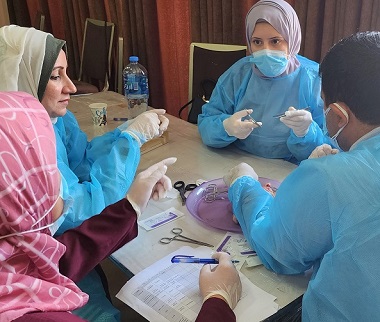
14 August 2023 – WHO organized a 3-day training workshop for health workers in the West Bank and Gaza Strip to improve their capacity in providing high-quality, evidence-based intrapartum care.
The training was attended by 24 obstetricians and midwives in the West Bank and 35 in the Gaza Strip, respectively. The training was based on new and existing WHO recommendations that emphasize the importance of women-centred care to optimize the experience of labour and childbirth for women and their babies through a holistic, human rights-based approach.
WHO’s intrapartum care model is based on several components to ensure a positive childbirth experience. It includes respectful maternity care, emotional support during childbirth, effective communication, pain management, continuity of care, regular monitoring during childbirth, skilled and competent and birth attendants, and a well-functioning health system.
The training focused on a few core components of the model, such as the "Labour Care Guide" that aims to improve medical staff practices in labour and deliver, quality diagnosis and management of perineal injuries and how to avoid ineffective or potentially harmful practices. Health workers were also encouraged to consider how women’s individual health can affect delivery.
Throughout the sessions, the trainers provided vital context around maternal and newborn health in the occupied Palestinian territory (oPt). They also recognised the significant steps that have already been taken to reduce maternal and neonatal morbidity and mortality in oPt and highlighted the pivotal role of antenatal and intrapartum care in its prevention.
“Ensuring the mother’s health after childbirth is a key priority. Today’s training provided health workers with knowledge and tools to accurately diagnose and timely treat internal injuries and lacerations to prevent future complications. We also trained them in surgical suturing so they can stop internal bleeding that can occur during birth”, said Dr Hadeel Al-Masry, one of the trainers.
Feedback from participants following the training was very positive. Dr Ahmad, from Yatta Government Hospital in the West Bank, found the training useful for his daily work in the maternity ward. “Every day we deal with patients suffering from internal injuries due to childbirth. This training will help us effectively diagnose the extent of perineal injuries and treat them”.
Dr Alaa, an obstetrician and gynaecologist at Nasser Medical Complex in Gaza Strip, said that in addition to the theoretical and practical skills they acquired during the training, participants also learned the importance of communicating with patients. “Open communication with women during labour and delivery can improve diagnosis of internal injuries and prevent irreversible complications and health problems.”
Following the training, health workers were keen to influence and support more dignified, responsive and respectful maternity care in their hospitals, as well as pass on the knowledge to their colleagues. Post-training supervision visits will now be conducted to assess the knowledge and skills of health care providers.




